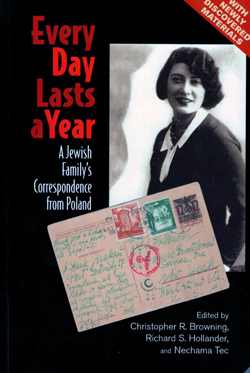Every Day Lasts A Year: A Jewish Family’s Correspondence From Poland edited by Christopher R. Browning, Richard S. Hollander and Nechama Tec; Cambridge University Press; © 2014; ISBN 9781107-668768; 290 pages including index.
By Donald H. Harrison

 SAN DIEGO – Richard Hollander, one of the editors of this work, is the son of Joseph Hollander, variously called “Josek” and “Joziu” in brave letters written to him by his family in German-occupied Poland prior to America’s entry into World War II.
SAN DIEGO – Richard Hollander, one of the editors of this work, is the son of Joseph Hollander, variously called “Josek” and “Joziu” in brave letters written to him by his family in German-occupied Poland prior to America’s entry into World War II.
The letters from his mother, three sisters, three brothers-in-law, and two nieces are cordial and hopeful, but for modern-day readers they are heart-breaking because we know what happened to most of the Jews of Poland, including Hollander’s family.
Because the Nazis censored the letters, Joseph’s family members referred only obliquely to their suffering under German rule, but their professions of love, and longing to at last be together again, carry much emotional content.
Many of the letters are repetitive, as for example Joseph’s mother writing that she doesn’t have much to say except that she sends a thousand kisses.
As the correspondence continues, however, we become aware of some of the rifts in the family under the pressure of the Nazi tyranny. One sister says the husband of another sister has nothing nice to say about anyone who isn’t rich, except Joseph, because Joseph, being in America, is useful to the family.
Joseph was indeed useful; sending packages of food to his mother, siblings and two nieces; relaying messages from other Krakow residents to their family members in America; and trying desperately, albeit without success, to get his relatives out of Europe. At one point he was able to obtain passports from Nicaragua for them, but by that time the Nazis had tightened the net. Jews with foreign passports in Poland were forbidden to leave unless they also could prove citizenship.
We also read about another of Joseph’s sisters, after ten years of a loveless marriage, deciding to divorce the husband who has been living away from her in another city. Before she could do so, however, that husband died, and she married another man, who begged Joseph in letters to accept him.
Despite the grim circumstances, the book has flashes of humor. For example, one member of Joseph’s family observed that the more she learned about fellow humans, the more she treasured dogs!
The collection of letters is preceded by thoughtful essays about Joseph’s life and about the situation facing the Jews of Krakow during the Holocaust.
Because we read the words of nine Jewish victims, not in retrospect, but at the very time the Germans were expropriating their businesses, and later moving them into ghettos, this book takes on added importance. Notwithstanding the privations they faced, Joseph’s family members remained optimistic. They could not conceive what was in store for them.
*
Harrison is editor of San Diego Jewish World. He may be contacted via donald.harrison@sdjewishworld.com. Comments intended for publication in the space below MUST be accompanied by the letter writer’s first and last name and by his/ her city and state of residence (city and country for those outside the United States.)